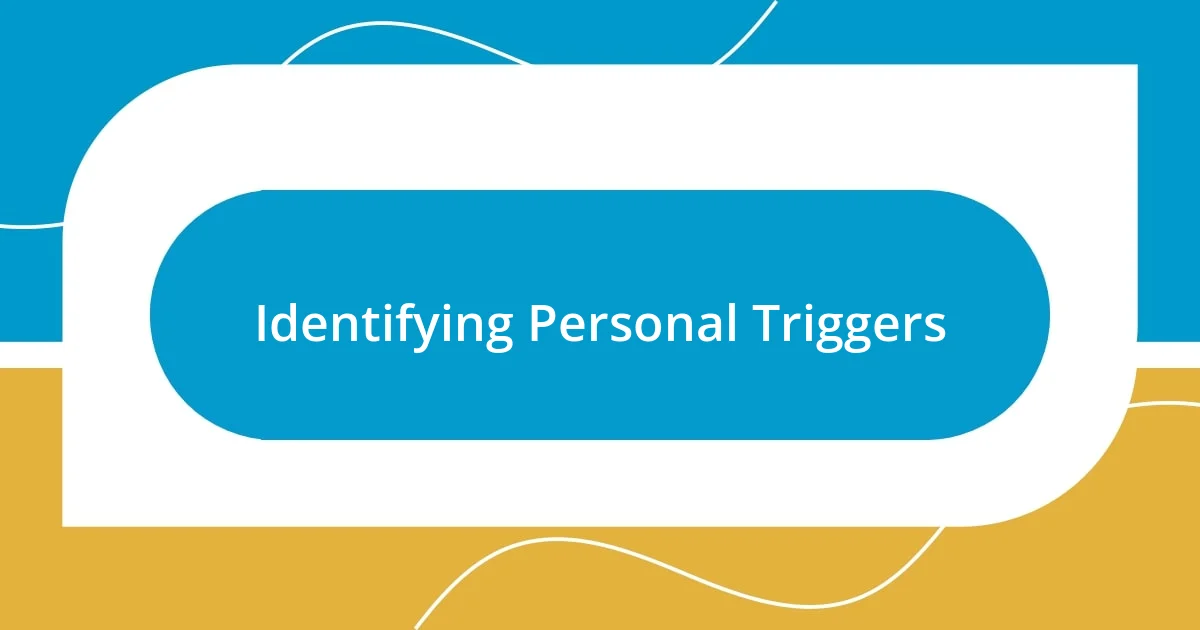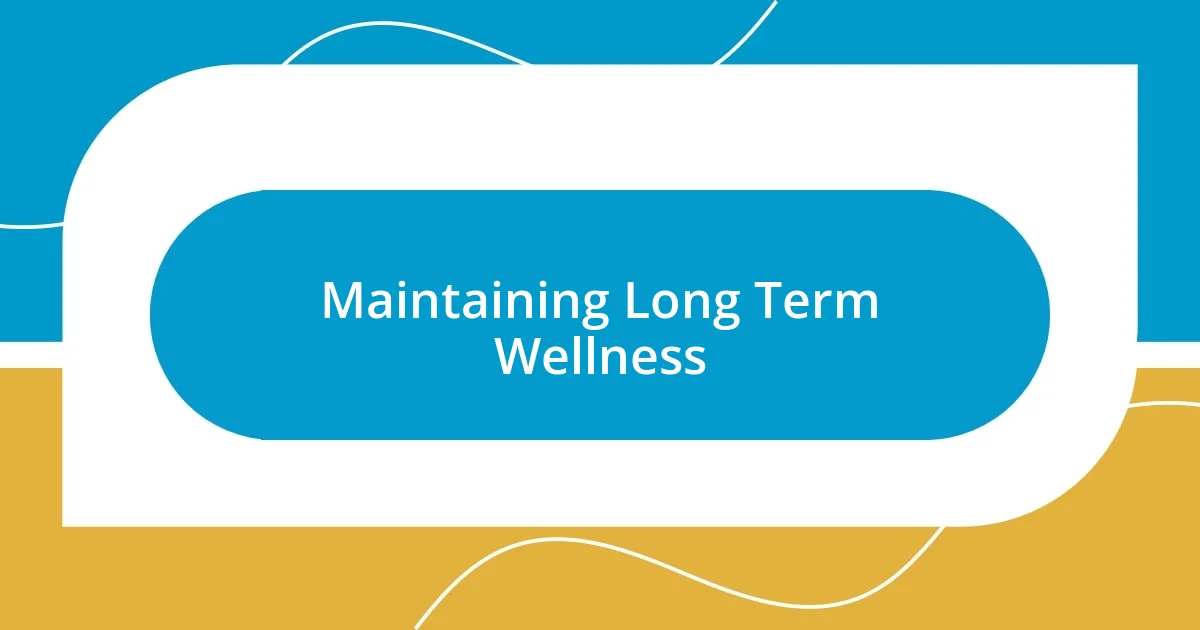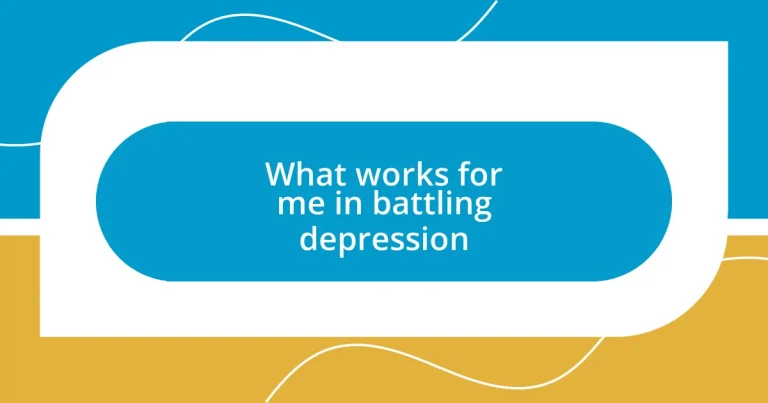Key takeaways:
- Understanding depression requires recognizing personal triggers, including conversations, environmental factors, and seasonal changes, which significantly impact mental health.
- Effective coping strategies, such as establishing a routine, engaging with nature, and practicing mindfulness, can enhance emotional well-being and provide structure.
- Seeking professional help and building a supportive network play crucial roles in managing depression and maintaining long-term wellness through shared experiences and expert guidance.

Understanding Depression Causes
Depression isn’t a one-size-fits-all issue; it often stems from a complicated mix of factors. Personally, I remember struggling through a particularly gloomy period that felt like it had no end. Looking back, I realize that my mental state was influenced by a combination of genetics, environment, and stressful life events, leading me to wonder how interconnected these causes truly are.
A significant trigger for me was the constant pressure from work and personal expectations. Can you relate? Sometimes, it feels like there’s this invisible weight pushing you down, making daily tasks feel monumental. It’s fascinating how our surroundings can shape our mental health, whether it’s a toxic work environment or a lack of support from loved ones.
Moreover, I’ve found that physical health plays a crucial role in mental well-being. When my sleep patterns were disrupted, or I wasn’t eating well, it felt like my mind and emotions spiraled even more. Have you ever experienced this? Understanding how physical and emotional health intertwine often reveals deeper insights into the roots of depression.

Identifying Personal Triggers
Identifying my personal triggers was like piecing together a jigsaw puzzle. I vividly remember those days when just a simple conversation could unsettle my emotions. For example, I realized that discussions about past failures would often leave me feeling anxious and defeated, almost as if I was re-living those moments all over again. Have you ever noticed how certain conversations can shift your mood instantly?
In my experience, environmental factors play a significant role in triggering my depressive episodes. Once, I moved to a new city, filled with excitement and expectations. However, the noise and chaos of the urban life eventually overwhelmed me, leading to feelings of isolation. It’s essential to pay attention to our surroundings because even something as mundane as clutter can subtly chip away at our mental health. Are there particular environments that drain your energy, too?
Another layer to this involves recognizing specific times of the year that impact my mood. For instance, during winter, when daylight fades earlier, I consistently feel more lethargic and blue. I’ve learned to anticipate these seasonal shifts and take proactive measures to combat them, like scheduling more social activities or finding time to engage in winter sports. Have you tracked your own feelings throughout the seasons to uncover patterns?
| Type of Trigger | Personal Example |
|---|---|
| Conversations | Discussing past failures triggers anxiety |
| Environment | Moving to a noisy city caused feelings of isolation |
| Seasonal Changes | Winter leads to lethargy and sadness |

Effective Coping Strategies

Effective Coping Strategies
Over the years, I’ve compiled a toolkit of coping strategies that truly make a difference in my life. One of the most impactful has been establishing a consistent routine. I recall a phase when I felt completely adrift, but creating a daily schedule gave me a sense of control and purpose. Starting my mornings with small activities, like drinking herbal tea and journaling, played a big role in setting a positive tone for the day.
In addition to routine, connecting with nature has proven vital for my mental well-being. I often find solace in walks at a local park, where a simple stroll helps clear my mind. Nature has this incredible power to ground me, and I can’t help but feel more centered afterward. Incorporating activities like this into my week has made every bit of difference.
- Establish a daily routine for structure and stability.
- Incorporate nature walks or outdoor activities to rejuvenate your spirit.
- Practice mindfulness or meditation to promote inner peace.
- Limit screen time, especially on social media, to reduce overwhelm.
- Engage in creative outlets, like painting or writing, tapping into self-expression.

Building a Support Network
Building a support network has been crucial in my journey through depression. I can still recall a time when I felt utterly alone, shutting myself off from friends and family. I decided to reach out to a close friend, and it was amazing how just talking to someone who understood my struggles lifted some weight off my shoulders. Have you ever felt that relief just from sharing your burdens?
Having a diverse support network is incredibly beneficial, too. One weekend, I joined a local support group, and what struck me most was the camaraderie and shared experiences in that room. Laughing at funny stories and connecting with others reminded me that I wasn’t alone in my feelings. Does finding connections with others help you feel less isolated during tough times?
I’ve learned that it’s not only about getting support but also nurturing relationships. For instance, I started scheduling regular coffee catch-ups with a few friends who knew my struggles. It’s such a small commitment, but those moments served as lifelines, providing encouragement and laughter when I needed it most. How have you made an effort to maintain the bonds that uplift you?

Lifestyle Changes for Improvement
Lifestyle changes have profoundly improved my battle with depression, and I find that small adjustments can lead to significant shifts in mood. For instance, I began practicing mindfulness each morning, even if just for five minutes. It amazed me to notice how a few deep breaths and focusing on the present helped clear the mental fog that often accompanied my day. Have you ever given yourself that moment to just breathe?
Another change that has been pivotal for me is limiting screen time, particularly on social media. I remember evenings spent scrolling, feeling drained and overwhelmed by the barrage of information. By setting boundaries, like a digital curfew an hour before bed, I noticed my sleep quality improved remarkably. What would it feel like to disconnect and reclaim that time for yourself?
Engaging in creative outlets, like sketching or writing poetry, has also brought a vibrant spark to my days. There was a time when I felt emotionally muted, but picking up a brush allowed me to express feelings that words couldn’t capture. It’s incredible how creativity can offer a safe space to process emotions—have you explored your creative side to unlock new depths of understanding?

Professional Help and Therapy

Professional Help and Therapy
Seeking professional help was a pivotal moment in my journey with depression. I remember walking into my therapist’s office for the first time, feeling a mixture of hope and anxiety. Talking to someone trained to understand my pain made a world of difference—have you ever experienced that feeling of being truly heard for the first time?
I found that therapy isn’t just about sharing feelings; it’s also about learning practical strategies to cope with daily challenges. In my sessions, I’ve delved into cognitive behavioral therapy, which helped me recognize and reframe negative thought patterns. It was eye-opening to realize that my thoughts weren’t always facts; how empowering is it to take control of that narrative in your life?
The process of finding the right therapist took time, but it taught me the importance of connection in therapy. Not every therapist was a match for me, and that’s okay! I learned to listen to my intuition—just like dating, I needed to find someone who resonated with my experiences. Have you considered how significant it is to connect with someone who understands your unique story? These experiences reinforced my belief that professional help is a crucial tool in managing depression.

Maintaining Long Term Wellness
One of the most transformative steps I took in maintaining long-term wellness was establishing a consistent routine. I recall feeling aimless and drifting through my days until I decided to create a structured schedule. Now, I carve out specific times for work, exercise, and relaxation, which helps me feel a sense of accomplishment each day—how do you structure your day to nurture your mental health?
Physical activity has also played a crucial role in my long-term wellness. I’ve discovered that even a brisk 20-minute walk can drastically uplift my mood. It’s fascinating how movement releases endorphins, those natural mood lifters. It makes me wonder—when was the last time you experienced that euphoric energy from just stepping outside?
Another key aspect is nurturing my social connections. I learned that isolating myself only deepened my struggles, so I made a conscious effort to reach out to friends, even during tough times. I remember having a spontaneous coffee date that turned into a heartfelt conversation, reminding me of the power of shared experiences. How often do you take the time to check in with loved ones, even if it feels challenging?














